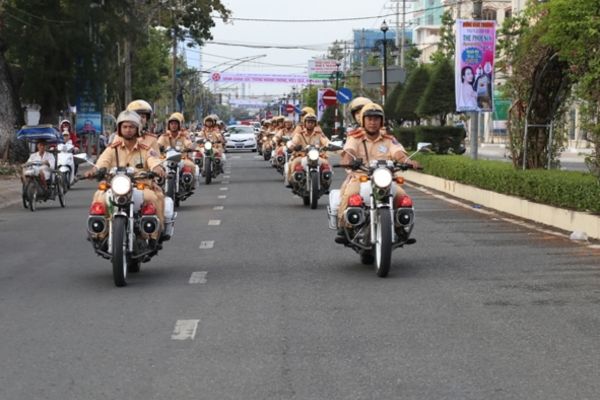Traffic Police of Provinces and Centrally-Run Cities: Patrol, Control, and Handling Violations on Which Routes?
Which Roads Do Traffic Police in Centrally Governed Provinces and Cities Patrol, Monitor, and Handle Violations On?
Pursuant to Clause 1, Article 6 of Circular 32/2023/TT-BCA governing routes and areas patrolled, monitored, and handled for violations by the Police of centrally governed provinces and cities:
Routes and areas patrolled, monitored, and handled for violations by the Police of centrally governed provinces and cities
1. The Traffic Police Division of the Police Department of centrally governed provinces and cities assigns forces to organize patrols, monitor, and handle violations on road traffic routes within the administrative boundaries of the locality, including:
a) Highways located entirely within the administrative boundaries of one province or centrally governed city;
b) Key national highways, national highways with complex traffic order and safety situations (including bypasses of districts, district-level towns, cities under the province, cities under centrally governed cities, and commune-level towns under districts); road traffic routes that are significant for local economic-social development, ensuring security and defense;
c) Urban roads under centrally governed cities, including: Main roads; roads with complex traffic order and safety situations;
d) If necessary, organize forces to directly conduct or coordinate with district police, district-level towns, cities under the province, cities under centrally governed cities (hereinafter referred to as district-level police), and related forces to conduct patrols, monitor, and handle violations on road traffic routes according to plans issued by the Director of the provincial or centrally governed city police (hereinafter referred to as provincial police director).
...
According to the above regulations, traffic police in the province patrol, monitor, and handle violations on the following roads:
- Highways located entirely within the administrative boundaries of one province or centrally governed city;- Key national highways, national highways with complex traffic order and safety situations;- Road traffic routes significant for local economic-social development, ensuring security and defense;- Urban roads under centrally governed cities.
Additionally, provincial traffic police may directly conduct or coordinate with district-level police and related forces to patrol, monitor, and handle violations on road traffic routes according to plans issued by the provincial police director.

Which Roads Do Traffic Police in Centrally Governed Provinces and Cities Patrol, Monitor, and Handle Violations On? (Image from the internet)
What Types of Documents Can Traffic Police Check from Vehicle Operators?
Pursuant to Point a, Clause 2, Article 12 of Circular 32/2023/TT-BCA, traffic police are authorized to check the following types of documents from vehicle operators:
- Driver's license;- Certificate of road traffic law knowledge training, special-purpose motorcycle operating licenses, and certificates;- Vehicle registration certificate or a certified copy of the vehicle registration certificate accompanied by the original receipt from the financial organization (valid for the term during which the financial organization retains the original vehicle registration certificate);- Inspection certificate, inspection stamp for technical safety and environmental protection, certificate confirming the validity period of the inspection certificate and inspection stamp (for vehicle types required for inspection);- Mandatory civil liability insurance certificate for motor vehicle owners and other necessary related documents as prescribed (hereinafter collectively referred to as documents).
What Types of Weapons and Support Tools Are Traffic Police Equipped When Patrolling and Monitoring?
Pursuant to Clause 3, Article 13 of Circular 32/2023/TT-BCA, the regulations are as follows:
Attire; equipping transportation vehicles, professional technical means, and tools, weapons, support tools of the Traffic Police when patrolling and monitoring
...
3. Weapons and support tools include: Handguns, rifles, submachine guns, taser guns, net guns, rubber bullet guns, tear gas guns, marker bullet guns, pepper spray, stun batons, bulletproof vests, handcuffs, traffic control batons.
4. Professional technical means and tools are equipped and used as prescribed by the Law on Handling Administrative Violations (amended and supplemented in 2020), Decree No. 135/2021/ND-CP, and standards and norms prescribed by the Ministry of Public Security. These tools are openly or covertly installed on road traffic routes, at Traffic Police Stations, on transportation vehicles, equipped for Traffic Police Teams, operated directly by Traffic Police officers to detect and collect information on violations of road traffic laws and other laws as prescribed.
The types of weapons and support tools traffic police are equipped with when patrolling and monitoring include:
- Handguns- Rifles- Submachine guns- Taser guns- Net guns- Rubber bullet guns- Tear gas guns- Marker bullet guns- Pepper spray- Stun batons- Bulletproof vests- Handcuffs- Traffic control batons
LawNet